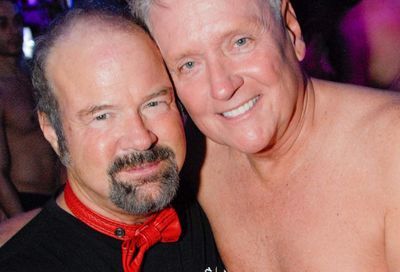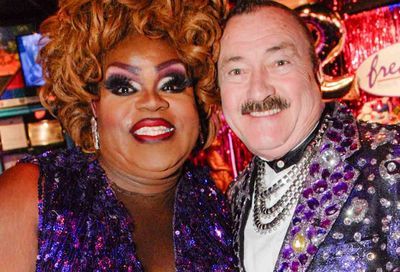2-in-5 Residents Consider Leaving Florida Over “Don’t Say Gay”
A survey finds that 40% of residents have considered leaving Florida due to the "Don't Say Gay" law, a move applauded by state GOP officials.

A new study shows that nearly 40% of Florida residents have considered leaving the state since the passage of the “Don’t Say Gay” law, with local Republicans encouraging the law’s detractors to follow through on such plans.
According to a new survey by the Williams Institute, an LGBTQ policy think tank at UCLA’s School of Law, half of the 40% considering leaving Florida claimed they “very much so” wished to leave the state.
Overall, 11% of survey respondents said they would likely move within the next two years.
Yet despite its significant number of detractors, the law enjoys majority support — not only in Florida, but nationwide, with 51% of U.S. residents supporting the idea of banning mentions of sexual orientation and gender identity in schools, according to a recent Politico/Morning Consult poll.
The law, the “Parental Rights in Education Act,” more commonly known as the ‘Don’t Say Gay’ law, prohibits classroom instruction or discussions dealing with sexual orientation or gender identity in all K-12 public schools, with rare exceptions for high-school level biology or sex education classes, where the topic may only be mentioned in passing.
An expanded version of the law also makes it easier to challenge books that people may find “objectionable” or “inappropriate” for minors — designations that, while ill-defined, have historically been used to target books by LGBTQ authors or that feature LGBTQ characters, even if their identity is not central to the main plot.
Opponents of the law argue that it implicitly sends a message of disapproval to LGBTQ-identifying students and infringes upon Floridian’s First Amendment rights.
The Williams Institute survey finds that support or opposition to the Republican-backed law, which has the full support of Gov. Ron DeSantis, a 2024 contender for the Republican presidential nomination, is largely divided along party lines. Only 29% of Democrats support the law, compared to 89% of Republicans. Independents are more narrowly divided, with 47% supporting the law.
Additionally, 46% of Florida residents say they disapprove of the expansion of the “Don’t Say Gay” law — which initially only applied to students in grades K-3, with lessons in older grades required to be “age and developmentally appropriate” — to include middle school- and high school-aged students.
The expansion is supported by only 20% of Democrats and 40% of independents, but by nearly 9 in 10 Republicans.
The numbers indicate that a substantial amount of residents – presumably Democrats and more left-leaning independents – want to leave the state. While most state officials dread losing population or being seen as driving potential residents away, Florida GOP officials indicate they would gladly shed population to rid the state of people who aren’t supportive of the Republican Party’s socially conservative agenda.
Florida Republican Party Chair Christian Ziegler told the Washington Examiner that “if a Democrat voter is passionate and perverted enough to support the sexualization of kids during school in grades as early as kindergarten, then I would agree that Florida is probably not the best fit for them.”
In a post on X, formerly known as Twitter, Ziegler equated supporting the LGBTQ community — or at the very least, demonstrations or pronouncements of LGBTQ visibility — to being a pedophile.
“If the Florida Democrat Party wants to fix their registration woes, they should start by ending their vile support for the indoctrination, sexualization and mutilation of our CHILDREN!” he tweeted.
Sane Voters are FLEEING the Democrat Party because of their Radical Agenda.
If the Florida Democrat Party wants to fix their registration woes, they should start by ending their vile support for the indoctrination, sexualization and mutilation of our CHILDREN! pic.twitter.com/dRiLJlq3km
— Christian Ziegler 🇺🇸 (@ChrisMZiegler) August 13, 2023
The Williams Institute survey polled “a diverse sample of 106 parents in Florida” who had at least one child under age 18.
That sample, the study’s authors argue, while small, may reveal commonalities in parents’ responses to the law, regardless of their personal political preferences — a possible silver lining amid partisan politics.
“It is important to understand the diverse viewpoints Florida parents have around the state’s ‘Don’t Say Gay law,'” Abbie Goldberg, a professor of psychology at Clark University and author of the survey, said in a statement.
“These parents live in the same neighborhoods and send their children to the same schools. They have the power to work across differences to build strong communities that support the well-being of all children.”
Support Metro Weekly’s Journalism
These are challenging times for news organizations. And yet it’s crucial we stay active and provide vital resources and information to both our local readers and the world. So won’t you please take a moment and consider supporting Metro Weekly with a membership? For as little as $5 a month, you can help ensure Metro Weekly magazine and MetroWeekly.com remain free, viable resources as we provide the best, most diverse, culturally-resonant LGBTQ coverage in both the D.C. region and around the world. Memberships come with exclusive perks and discounts, your own personal digital delivery of each week’s magazine (and an archive), access to our Member's Lounge when it launches this fall, and exclusive members-only items like Metro Weekly Membership Mugs and Tote Bags! Check out all our membership levels here and please join us today!

























